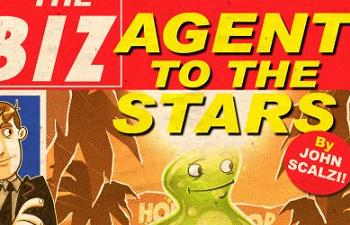Over the years, many authors have tried versions of the online donation model, with mixed results. But one specific genre of writers, speculative fiction, seems to be experiencing a moderate level of success.
Back in 2000, Stephen King became one of the first major authors to offer a book online using an “honor system” to solicit donations. The book was called “The Plant,” and was based on a series of chapbooks King had sent around to his friends in the ’80s. He placed the first chapter in various downloadable formats on his website, and downloaders were expected to donate $1 by mail or credit card. King said that as long as 75 percent of readers donated, he would continue to post new chapters.
According to news reports, the first few chapters either reached or nearly reached that 75 percent threshold, though the second chapter fell as low as 70 percent. Eventually, King raised the price to $2 per chapter. To compensate for this increase, he published more pages at a time. I was among the King fans who dutifully mailed in money each time I downloaded a new chapter.
But King’s system was flawed in several ways. First, 75 percent is a fairly high threshold to meet. Plus, he counted every single download, so if someone downloaded the PDF but then had to switch to the plain text version, King counted these as two separate downloads. He wanted his $2 (or $4 for later chapters.)
Eventually, the donation rate fell below 50 percent and King abandoned the project, promising to return to it at a later date. He hasn’t. Compared to the sales of most mid-list authors, the experiment was a huge success — at one point King wrote on his site that it had generated several hundred thousand dollars — but a piece in the New York Times inferred that it was a failure. Still, it garnered huge press attention because of its novelty. The question remains: could this be a viable business model for future works?
Success With Speculative Fiction
In early 1999, author John Scalzi (of the popular Whatever blog) released his book, “Agent to the Stars,” as a “shareware novel.”
“People could read it, and if they liked it, they could send me a dollar, or whatever sum they liked (even if that sum was zero),” Scalzi wrote of the experiment. “If they didn’t like it, well, clearly, they wouldn’t have to send me anything. It was a no-risk proposition for the reader. I didn’t expect to see a dime from it, but as it turns out, over five years I made about $4,000.”

Author Tim Pratt recently turned to the donation model after unsuccessfully shopping around a novella to small press publishers. The large publisher Bantam Spectra publishes his Marla Mason series, and Pratt developed an idea for a smaller work set within that same universe. The work wasn’t a full novel, yet it was also too long for short fiction magazines. After the small presses passed, Pratt put off the project — until his wife was laid off from her job.
“When I saw that [author Catherynne Valente] was trying [the donation model], I thought that I would, and the obvious thing was to write this thing that I already had,” he said. “If I knew what the story was going to be, I knew functionally it was just a piping exercise really.”
Pratt began publishing the chapters on his blog without any preconditions as to how much money had to be donated before subsequent chapters would be released.
“I would say that most the people reading it are fans of my series,” he explained. “But, certainly, some of the donors in the first couple of weeks were people who just felt for my situation, people who saw an opportunity to help us out. It’s sort of a good excuse to let people give you charity.”
Pratt didn’t provide exact figures for how many people have donated, but said he’s made more than he would have if one of the small publishers had picked it up. Some of the people gave one large donation, while others donated in small bits as new chapters were released. For the first few weeks, he had four or five new donors a day. Now, several chapters into it, he gets perhaps four or five new donors a week. I asked him if he viewed this as a sustainable business model for established authors who have built-in fan bases.
“It’s hard for me to say because I don’t know how much of the response to this has been based solely on its novelty,” Pratt replied. “It’s usually not that common of a thing, especially with books in existing universes that have come out from other publishers…I think going directly to your fans is something that writers should be open to — an increasing number of musicians are doing it — but with this particular project, I don’t know if it’s something I’d necessarily repeat.”
‘I Can’t Do Without My Chapter’
Sharon Lee and Steve Miller went a slightly different — and perhaps more business savvy — route when they began releasing one of their works in late 2006. The writing team has been collaborating on projects for years, and in December of that year they began having difficulties with one of their publishers.
“We announced … that we were going to write this side book, and put it out on the Internet,” said Lee. “And the rules were that the first chapter went up for free, anyone could read it. The second chapter would depend on it earning $300, and people could donate as much or as little as they wanted. They could donate 50 cents, or the sky is the limit. And when it got to $300, we’d turn it out into the wild and anyone could read it again. By the time we started releasing the book on the Internet, it was January 2007 and we had five chapters already written. The book was well paid for before we were halfway through [publishing] the book.”
Donors who gave a minimum of $25 were guaranteed a free print edition of the book, if one was ever released. They said approximately 1,066 donors reached this threshold.

“About the fifth week, we had an occasion to be a little late [in releasing a chapter], and people began to worry that we weren’t going to post,” said Miller. “And pretty soon people were setting their clocks in Australia at the right time to get it when the chapter was supposed to come out, and we were getting notes from people saying ‘I can’t do without my chapter this week.’ “
As former newspaper reporters, the duo said that this is the kind of project for someone who is adept at writing on deadlines; otherwise, the author risks falling behind or becoming disheartened by a lack of results. Though Lee felt this could be a good business model for authors with established fan bases, she said it probably wouldn’t be viable for amateur authors trying to build a following.
Cory Doctorow’s Experiment
Though many writers are just starting to experiment with this new format, there’s at least one notable author who’s ready to compare its effectiveness to traditional publishing. Cory Doctorow, a science fiction author and co-editor of the popular Boing Boing blog, has released several books under Creative Commons licenses. He believed that the free publicity resulting from this strategy would lead to higher print sales. Recently, he announced plans to bypass traditional publishing completely, and then publish his results for all to see.
“Here’s the pitch: the book is called ‘With a Little Help,’” he wrote in Publisher’s Weekly. “It’s a short story collection, and like my last two collections, it’s a book of reprints from various magazines and other places (with one exception, more about which later). Like my other collections, it will be available for free on the day it is released. And like my last collection, ‘Overclocked,’ it won’t have a traditional publisher.”
The book will be put out through a variety of self-published formats — ranging from e-book, to audiobook, to print — and Doctorow will record all the income that it generates, whether it’s from donations, speaking gigs, or even the money paid for his Publisher’s Weekly column on the experiment.
“There’s plenty more details, of course — how I’m going to use Twitter, what I’m going to do to get this into bookstores, the marketing and publicity plan,” Doctorow wrote. “But I’m out of space for this month — and many of those details will fill a column on their own. One thing I need to mention, though: I’m seriously considering writing a book about the experiment, no matter how it turns out, selling it to a traditional publisher and adding the advance to the balance sheet.”
Simon Owens is a social media consultant and associate editor for MediaShift. For more about him read his blog or contact him at [email protected]


South African speculative fiction author David Freer is also using a “storyteller’s bowl” approach with an as yet unpublished novel, “Save the Dragons” to finance moving his dogs and cats to Australia. The Freers are moving to Flinders Island, Tasmania and the animals must be quarantined. The project has been quite successful, with about 75% of the novel posted and subscribed to.
Walt beat me to the “Save the Dragons” note – url is http://savethedragons.nu
I’ve also attempted a sort of “freemium” approach to my own speculative fiction novel, Under the Amoral Bridge. I’ve posted the entire novel on the Bridge Chronicles blog (http://amoralbridge.blogspot.com) as well as its sequel, and have just begun selling the first novel in trade paperback and ebook form while the online version is still available . The response is slow, but better than I could expect for an unknown. I think given time, it could be a successful model for the independent author. The free version is ad-supported, and includes excerpts not seen in the print/ebook version, while the print/ebook version has an unpublished short story, to give all channels something unique.
Why is losing weight so hard? Why is keeping it off even harder? How to lose weight while you are still upset you?
Well, today I would recommend to you a number of weight loss helper – [url=http://www.p90xkicks.com][b]p90x[/b][/url].The [url=http://www.p90xkicks.com][b]cheap P90X workout[/b][/url] program is divided
up into 3 distinct phases, each with a separate workout schedule, nutrient breakdown, and goals.then [url=http://www.p90xkicks.com][b]p90x[/b][/url]
can hele
you build endurance, and sculpt your muscles.[url=http://www.p90xkicks.com][b]P90X[/b][/url] can give you strength and make you regain Confidence. Our
p90x
also conclude dvds.These [url=http://www.p90xkicks.com][b]cheap p90x dvds[/b][/url] will help you get on the path of better fitness and health.